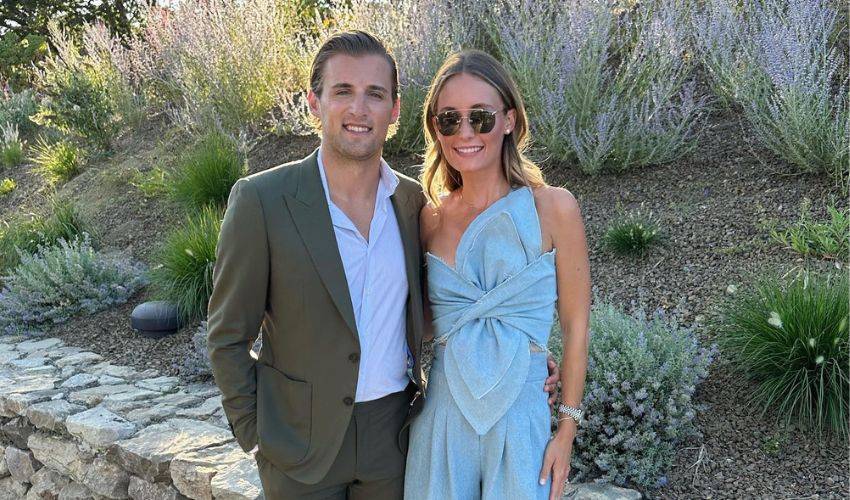Wideman turns injury into off-ice success
Chris Wideman and his wife, Caroline, never thought they would be in the hair salon business. The Montreal Canadiens defenceman shares his journey through NHLPA UNLMT.

Feature Photo: IG / @cmomowides
Chris Wideman did not have a long-standing yearning to own a chain of hair salons.
Just in case you were wondering.
And that is kind of the beauty of all of this, is it not?
The skilled Montreal Canadiens defenceman is tending to an injury that has kept him out of the Habs’ lineup all season, but that does not mean he has trouble putting in the time. In fact, Wideman is using his time away from the game to help add another building block to the family’s away-from-hockey life as he and his wife, Caroline, are exploring adding a third hair salon to their Drybar St. Louis locations in Clayton and Frontenac.
The Widemans are from the St. Louis area and are expecting their second child in March. Caroline is, according to her husband, the quarterback, the starting pitcher, the power-play quarterback and whatever other sports allusion you can think of when it comes to directing the family’s growing business operation.
But it is also clear this is a partnership in the truest sense of the word.
As they were getting their first franchise off the ground, Wideman estimates that for probably two straight years, Caroline slept with a laptop at their bedside in case there were business developments that needed immediate attention.
“She works so fricking hard,” Wideman said. “She’s a go-getter and hustler. She’s the best partner I could have asked for not only in life but in this business venture.”
Wideman is part of the NHLPA UNLMT initiative that helps connect current players with specific interests outside of hockey, ranging from business opportunities to philanthropic endeavours.
In some ways, Wideman perfectly illustrates the myriad ways the program can benefit a player’s life –from financial security beyond a playing career to enhancing the player’s level of play in the here and now.
NHLPA UNLMT Personal Strategists John Hierlihy and Duncan Fletcher both work closely with players in a one-on-one forum to help them take the next steps towards pursuing their interests away from the game. Hierlihy spoke at length with Wideman about his aspirations away from the rink.
“Everything we’re trying to do with NHLPA UNLMT, in terms of the overall philosophy,” Hierlihy said, “that’s what Chris has done naturally.”
What struck Hierlihy about his conversation with Wideman, and what has stuck with him long since, was how Wideman described feeling that his game improved once he was well into his off-ice business life.
Wideman told NHLPA.com in a recent interview that peace of mind can be difficult to find as a professional athlete, but knowing he is building a foundation for his family that transcends the game has allowed him to realize his potential as a player.
“I would say a massive part of the success that I’ve had the past few years is just knowing that at the end of the day I have something that’s going to be there for me when I’m done playing,” Wideman said. “And not just for me but for my family.”
This is NHLPA UNLMT in a nutshell – life in addition to hockey.
“That is music in my ears,” Hierlihy said.
There is still research to be done, but the NHLPA UNLMT team continues to compile data to quantify the relationship between developing off-ice pursuits and how that affects on-ice performance.
It is not just short-term success, as in players playing well in the here and now, but the belief that having these interests can be a catalyst to extending players’ careers.
Wideman attended Miami University in Ohio where he excelled during his four seasons with the RedHawks. After his freshman year, Wideman was selected by the Ottawa Senators with the 100th overall pick in the 2009 NHL Draft.
Rico Blasi coached Wideman during his four-year run at Miami. Blasi, now coaching at the University of St. Thomas in Minnesota, said there were a couple of tenets the coaching staff tried to reinforce each year, which included being in the moment and not taking things like playing hockey for granted.
“I think over the years Chris really bought into that,” Blasi said. “By the time Chris left, I think we had done a pretty good job, and he was ready to take on whatever came next.”
The long-time coach, who also coached Wideman’s brother, Alex, said he is not surprised that Wideman and his wife are successful in their business ventures.
“I think it’s just part of his evolution from when he was a young player,” Blasi said.
Being a smaller player, “every step of the way he had to prove himself,” the coach expanded.
Wideman was always very flamboyant, Blasi said.
“And I love him for that. But I also know there’s a deeper side of him that’s very compassionate, very loving, very caring and would do anything you asked him,” Blasi said.
“We all have our paths, and we all have our own destiny and I think Chris has always been that guy, you always knew that at some point he was going to be running something,” Blasi added. “I’m extremely proud of him.”
After leaving college, Wideman admitted the first seasons playing in the Senators’ farm system were difficult.
Erik Karlsson was a standout on the Ottawa blue line at that time and the options were limited for a skilled, puck-moving defender to find a place on the NHL roster.
For three seasons, Wideman did not receive a single call-up to join the big club in Ottawa.
After his third season with Binghamton, Wideman was named the top defenceman in the American Hockey League. But so discouraged was he about his prospects at taking the next step, that he considered retiring.
He sought the counsel of his father, Gary, a long-time financial advisor.
Wideman ended up taking an internship with a private equity firm in New York’s Wall Street financial district.
It was Wideman’s first experience in the “real” world of business and finance. He learned not just about the stock markets but markets in general – knowledge that would play into what would become important life decisions for Wideman and his wife down the road with their hair salon business.
“It was a great experience, but I wasn’t ready for it at that point in my life,” Wideman said.
Wideman began his NHL career by making the Senators’ NHL roster out of camp in the season following that internship, and for the first time that meant making an NHL salary.
Early in the 2017-18 season, Wideman’s third as a regular NHL player, he suffered a hamstring injury and ended up missing the last three quarters of the season.
While he was rehabbing, what had been a backburner idea of starting a business away from hockey began to really percolate.
Caroline, his girlfriend at the time, had been living in Dallas and was familiar with the Drybar chain of salons. The two began investigating whether the venture would work in the St. Louis area where they believed there was a void in the marketplace.
In some ways it was a perfect storm for the couple. Wideman could use some of the knowledge gained while working in the financial sector that summer. He had achieved some flexibility financially to make investments because he was making an NHL salary, and he was a realist who knew that he was going to need to have security outside of hockey.
“There was an awareness at an early age that if you’re playing behind Erik Karlsson, you’re likely going to be at or near the league minimum,” Wideman said. “You’re going to need to do something else if you retire in your mid-30s.”
The fact that neither Wideman nor his wife had experience in running a franchise, and specifically a hair salon franchise, did not deter the Drybar ownership team from trusting the couple would make a good franchisee.
The tipping point, quite simply, was the fact that Wideman was an NHL hockey player. Wideman recognized the benefit of capitalizing on this status and the privilege it provided him and his family in the here and now, acknowledging that he and his wife may not have otherwise had the same access.
“He [the Drybar owner] straight up said ‘you guys are our youngest owners by almost 20 years,’” Wideman said.
The couple’s first shop will celebrate its fifth anniversary in May.
They were preparing to open their second location when Caroline was pregnant with their first child and opened a few months after their son, Henry, who is now two years old, was born.
“That was completely insane and totally crazy,” Caroline said.
A third shop is a definite possibility in the not-too-distant future.
“Obviously it ended up being a lot more work in so many different ways than I had expected initially,” Caroline said. There was the pandemic, which led to the shops being shut down for a time. There were labour issues. And her husband was in Russia for a time, and then switched teams at the NHL level.
“It was truly kind of a test for us, as a couple and as individuals,” Caroline added.
In some ways, the business career arc is similar to an athlete’s career arc.
“You see the really high aspect of owning your own business and of course you have the lows and the tough times,” Caroline said. “I think thus far it’s been very rewarding.”
Along with his time spent playing in the minors, and a year playing in the Kontinental Hockey League, Wideman says he never takes for granted the benefits of playing in the world’s best hockey league.
“The value of being an NHL player in terms of having access to things is unquantifiable. It’s unbelievable,” Wideman said. “All these opportunities that you’ve had as a player, if you don’t network properly, if you don’t follow up with opportunities, they’re going to be gone and you’ll never have that chance again.”
When players – especially young players who might not be thinking along the lines of ‘what else there is besides hockey’ – hear Wideman share his story, that is incredibly impactful as it relates to the importance of leveraging their experiences as current NHL players towards their passions and opportunities outside of hockey.
“It’s something I’ve definitely tried to share,” Wideman said. “I tell guys, did I ever think I would be in the hair business? No. Is it extremely profitable? Yes.”
“I turned a negative of a potential career-ending injury into a real positive for me and my family.”

